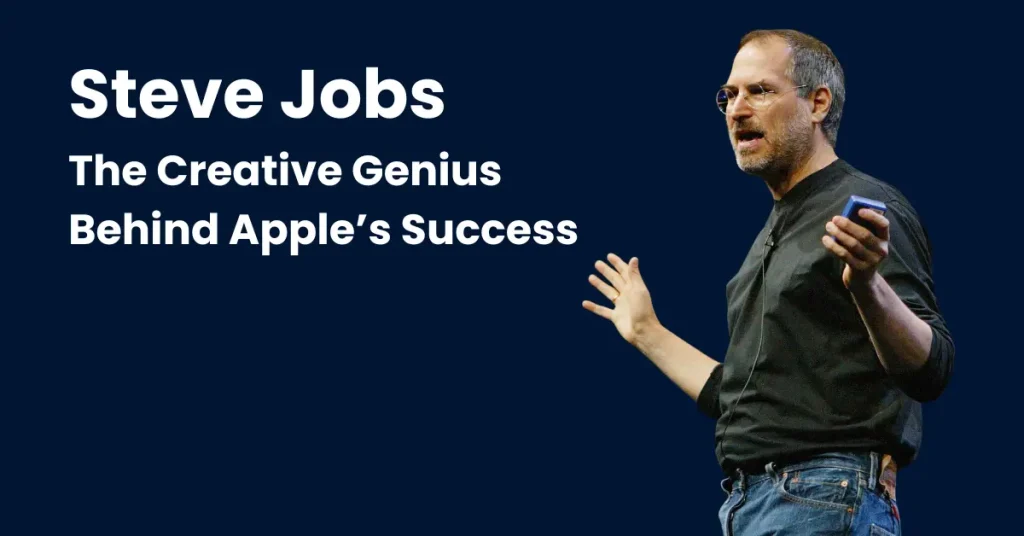Steve Jobs, a name synonymous with innovation and visionary leadership, revolutionized the world of technology and design. Co-founder of Apple Inc., Jobs transformed the personal computing and consumer electronics industries with groundbreaking products like the iPhone, iPad, and Macintosh. His story is a testament to how a blend of creativity, business acumen, and a refusal to settle for less can redefine industries and change the way people live and communicate

Early Years and Interest in Technology
Steve Jobs was born in 1955 in San Francisco, California, to two university students who gave him up for adoption. He was raised in Mountain View, California, by Paul and Clara Jobs, who encouraged his interest in electronics and tinkering from an early age. Jobs was deeply influenced by Silicon Valley’s engineering culture and the guidance of his father, who taught him how to build and fix electronics. By his teenage years, Jobs was already experimenting with gadgets and became fascinated with how they worked.
School Days and First Encounters with Technology
In high school, Jobs joined a student club at Hewlett-Packard, where he met engineers and developed a passion for electronics. During this time, he met Steve Wozniak, a fellow tech enthusiast who would later become his partner at Apple. Jobs’s unconventional approach to life became evident early; he frequently challenged authority and was known for his rebellious personality. Although he enrolled at Reed College, Jobs dropped out after six months but continued auditing courses, especially focusing on a calligraphy class that later influenced Apple’s design ethos.
Journey to India and Spiritual Exploration
After leaving college, Jobs traveled to India to explore spiritual practices and seek enlightenment. He spent months there, which profoundly influenced his philosophy and approach to life. Upon returning to the U.S., Jobs adopted Zen Buddhism, which he practiced for years, emphasizing simplicity and focus—qualities that later became hallmarks of Apple products. This period also marked his experimentation with psychedelics, which he believed had a lasting impact on his creativity and vision.
Founding Apple
In 1976, Jobs convinced Wozniak to join him in building and selling computers. They started working from Jobs’s garage in Los Altos, California, naming their new company “Apple.” Their first product, the Apple I, was a simple computer that they sold to hobbyists. However, the Apple II, released in 1977, became a groundbreaking product and one of the first mass-market personal computers. With this success, Apple grew rapidly, attracting investors and ultimately going public in 1980, making Jobs a millionaire by age 25.
Innovation and Challenges
As Apple expanded, Jobs began clashing with the board and other executives. His insistence on perfection and vision sometimes caused friction, leading to a notable conflict with Apple’s CEO, John Sculley. This culminated in 1985, when Jobs was ousted from Apple. Though devastated, Jobs soon started another company, NeXT, focusing on high-performance workstations. Although NeXT wasn’t commercially successful, it became influential in software development and was later acquired by Apple in 1996, bringing Jobs back to the company he founded.
Pixar and Return to Apple
While building NeXT, Jobs purchased Pixar Animation Studios from George Lucas, transforming it into a leader in animated films. Pixar’s success with movies like Toy Story brought financial success and established Jobs as a visionary outside the tech world. After returning to Apple in 1997, Jobs introduced innovative products like the iMac, iPod, iPhone, and iPad. These products redefined technology and consumer electronics, securing Apple’s status as one of the world’s most valuable companies.
Legacy and Impact
Jobs is remembered for his relentless drive, perfectionism, and focus on user experience. His belief in simplicity and his commitment to design have left a lasting impact on the tech industry, influencing product design across sectors. Although his journey was marked by challenges, his achievements continue to shape technology today. Jobs passed away in 2011, but his legacy endures as Apple remains one of the most successful companies globally.
Jobs’s life reflects the importance of vision, resilience, and a willingness to break conventions, establishing him as a pioneer whose influence parallels that of current tech giants like Elon Musk. His story shows how determination and creativity can drive success, inspiring future innovators to push the boundaries of what technology can achieve.
